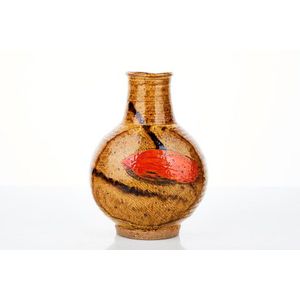Mitsuo Shoji's Dragonfly Stoneware Bottle Vase with Incised Decoration
You must be a subscriber, and be logged in to view price and dealer details.
Subscribe Now to view actual auction price for this item
When you subscribe, you have the option of setting the currency in which to display prices to $Au, $US, $NZ or Stg.
- Incised - A record of a name, date or inscription, or a decoration scratched into a surface, usually of a glass or ceramic item with a blunt instrument to make a coarse indentation. Compare with engraving where the surface is cut with a sharp instrument such as a metal needle or rotating tool to achieve a fine indentation.
- School of .... - In the opinion of the cataloguer, a work by a pupil or follower of the artist.
- Circa - A Latin term meaning 'about', often used in the antique trade to give an approximate date for the piece, usually considered to be five years on either side of the circa year. Thus, circa 1900 means the piece was made about 1900, probably between 1895 and 1905. The expression is sometimes abbreviated to c.1900.
This item has been included into following indexes:
Visually similar items

Col Levy, asymmetrical faceted unglazed vase, with Tenmoku inside neck, circa 1970, 41 cm high

Shigeo Shiga (Japanese/Australian, 1928-2011), Flask Vase, stoneware with faceted profile, in mustard yellow glaze with iron oxide and red slip decoration, artist's seals impressed near base, height 25 cm

Carved celadon glazed bottle vase the body and neck of the vase beautifully carved with two dragons disporting among bats and clouds under a smooth celadon ground of blue tone stopping neatly above the foot, Qianlong incised six character seal marks. Heigh

Daniel Lafferty vase of elongated bulbous form, woodfired, shine glaze to neck. Height 33 cm. Provenance: The Bandicoot pottery, Estate of Prof. Alan Walker
